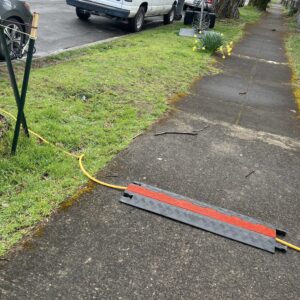As we reported on Tuesday, the Bicycle Transportation Alliance (BTA) is using the upcoming legislative session as a rebuilding year. Coming off a rough session in 2009 and accepting the reality of Oregon’s economic situation, instead of pushing for major new laws or funding bills, the BTA will focus on two minor tweaks to laws already in the books. Yesterday on their blog, the BTA clarified the changes they hope to make to the Vulnerable Roadway Users (VRU) law and the law that allows any Oregon resident to initiate violation proceedings against another party.
To improve the VRU law — which ups the consequences for vehicle operators who kill or seriously injure “vulnerable users of the roadway” — the BTA will look to do two things. The first, is to add driving with a suspended or revoked license as one of the violations (careless driving is the sole trigger now) that would trigger the law. The second is to clarify how police officers write up the citations when they suspect the VRU law should come into play. Here’s how the BTA explains it:
The vulnerable user law currently requires a police officer to note on the citation if a careless driving violation contributed to serious injury or death of a vulnerable user. However, police are reluctant to do so because it requires them to reach a conclusion that they perceive as more appropriately made in court. The 2011 proposal would clarify the notation the police officer would make on a citation for careless driving or driving suspended or revoked in situations in which a vulnerable user was seriously injured or killed. Under the proposed language, a police officer would make a notation on the citation if it appeared to them that serious injury or death to a vulnerable user had occurred.
Now, onto the second tweak they’d like to make…
In Oregon, citizens are allowed to try and cite another party for a violation after the incident occurred. “Initiation of Violation Proceedings” (a.k.a. citizen initiated citations) has been on the books for years, but for various reasons it’s not utilized as much as it could/should be. The BTA cites “a number of ambiguities” in the ORS that make it difficult to pursue this process. Here’s the skinny from the BTA:
“The legislative proposal would clarify the process for issuance and prosecution of citizen citations. Currently, if a driver who has been cited for a traffic violation is represented in court by an attorney, then the district attorney must prosecute the case. However, if the citation was issued by a citizen, the district attorney will have little knowledge of the particulars of the case and may have little interest in effectively prosecuting the case. The proposed bill would allow a citing citizen’s attorney, with the concurrence of the district attorney, to present the case on behalf of the prosecution if the defendant was represented. The bill also would clarify several other statutes to better identify the role of a citing citizen in prosecution of the case.”
Both of these tweaks are relatively minor and should not stir up much controversy. However, given how wonky and technical they are, the BTA might have difficulty getting legislators’ attention. Only a small fraction of the law changes proposed each session in Salem even get heard in committee, much less find their way to the Governor’s desk.
Stay tuned. We’ll keep you posted on all the bike-related action in the 2011 legislative session. Check out our archive page for all our past coverage of this topic.







Thanks for reading.
BikePortland has served this community with independent community journalism since 2005. We rely on subscriptions from readers like you to survive. Your financial support is vital in keeping this valuable resource alive and well.
Please subscribe today to strengthen and expand our work.
Huh? The case could be prosecuted as a VRU violation only if the defendant decided they needed an attorney, and then only if the DA agrees?
Isn’t that the same DA who decided they didn’t have enough of a case to prosecute Kirk Hannah for hit and run?
Perry…
you might be confused because I didn’t clarify it well enough in the story. I think you’re combining the two separate issues – the VRU law and the citizen citation law – but they are not related.
Ah, I see – yes I did misread, thanks. Leaving the VRU association aside, it appears as though a citizen would only be able to initiate a prosecution for a violation if and only if 1) the defendant decides they need an attorney, 2) The plaintiff is represented by an attorney and 3) the DA agrees to let the plaintiffs attorney prosecute the case?
In other words, we go from having little chance on our own, to zero chance of initiating a prosecution unless we have the bucks to hire a lawyer for a criminal prosecution AND the defendant does the same AND the DA decides it’s OK?
Seems like a step in the wrong direction.
No, the difference is in citizens initiated violations, if the defendant hires an attorney, the DA has to prosecute and probably won’t, but with the tweak to the law the citizen can hire a lawyer to “assist” the DA if the defendant hires one first. So in other words you can’t avoid a citizens initiated just by hiring a lawyer which is the situation now.
I think I’m getting it now (must be having a thick brain day). Right now, the best way to get the charges dropped if you’re a defendant is to hire an attorney, which forces the DA into making a conscious decision about whether to prosecute (or plea-bargain) or not.
The tweak would then make it more likely that the case would get heard because the DA would in effect be handing it off, and it would not enter into the DA’s internal cost-benefit woes that cause them to not go after it in the first place?
So, if I can afford my own attorney, I’d have a better chance at actually obtaining the justice that the citizen-initiated violations process is theoretically supposed to provide? Seems like I’d be far more likely to go hire a contingency lawyer and go after some money instead of a criminal case.
Seems like the BTA could pick an easier target that has a tangible benefit potential. I agree with Jonathan’s observation that this is a technical and “wonky” issue that’s unlikely to rise to any level of attention in Salem.
I’m not sure how careless driving relates to driving while suspended or revoked. In the case of careless driving I’d assume the officer is assigning blame to the motorist by citing careless driving, which is what they’re reluctant to do in the first place.
In the case of someone driving while suspended, what if someone with a suspended license is in a collision with a VRU where blame is ambiguous? With this new tweak the blame would automatically fall on the vehicle operator?
I know that some here feel that driving while suspended or revoked is really evil, but it can happen for overdue tickets, and in some cases I’ve come across drivers who paid their ticket late and then failed to pay an additional reinstatement fee (which someone at DMV might have failed to make them aware of…)
Maybe I’m missing something, but I don’t see how this fits with the spirit of the original law, it seems to just make it easier to apply in some cases.